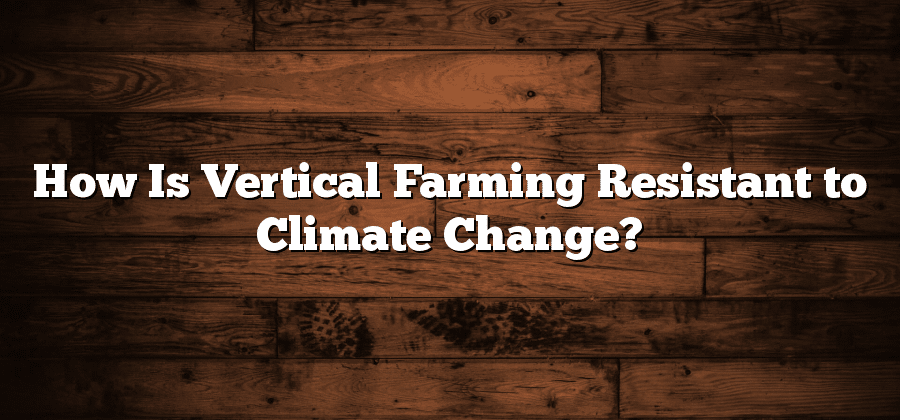Advantages of Vertical Farming in Harsh Environments
Vertical farming is an innovative solution that offers numerous advantages in harsh environments. One major benefit is the ability to utilize limited spaces efficiently. By stacking crops vertically in controlled environments, vertical farming maximizes land use, making it possible to grow large quantities of produce in small areas. This is particularly advantageous in harsh environments where arable land may be limited or unsuitable for traditional agriculture.
In addition, vertical farming allows for complete control over environmental conditions, such as temperature, humidity, and lighting. This level of control is crucial in harsh environments, where extreme temperatures, droughts, or other unfavorable conditions can hinder crop growth. By providing optimal conditions throughout the year, vertical farming ensures consistent and predictable yields, regardless of external factors. This not only improves food production but also reduces the reliance on climate-dependent agriculture, making vertical farming a reliable and sustainable option for these challenging environments.
Maximizing Crop Yields Through Controlled Environments
Vertical farming is a revolutionary technique that has gained immense popularity in recent years. By creating controlled environments, farmers can now maximize their crop yields like never before. The use of advanced technologies such as hydroponics, aeroponics, and LED lighting allows for precise control over the growing conditions, ensuring optimal growth and productivity.
One of the significant advantages of controlled environments in vertical farming is the ability to eliminate unpredictable weather conditions. Traditional farming methods are heavily dependent on climatic factors, which can often be inconsistent and harsh. With controlled environments, farmers can manipulate variables such as temperature, humidity, and lighting to provide ideal conditions for plant growth. This not only minimizes the risk of crop failure due to adverse weather but also allows for year-round cultivation, leading to a significant increase in crop yields.
Reducing Water Consumption in Vertical Farming Systems
Water is a precious resource, and in vertical farming systems, conserving water is crucial for sustainable and efficient operations. One way to reduce water consumption in these systems is through the use of advanced irrigation techniques. By employing precision irrigation systems, vertical farms can deliver the right amount of water directly to the roots of plants, minimizing wastage and optimizing water utilization. These systems can be equipped with sensors that monitor soil moisture levels and adjust irrigation accordingly, ensuring that crops receive just the right amount of water they need for growth. This not only helps conserve water but also minimizes the risk of waterlogging and root diseases.
Additionally, vertical farming systems can implement water recycling and reclamation practices to further reduce water consumption. By treating and reusing water that has been used for irrigation or cooling purposes, farms can significantly cut down their dependence on fresh water sources. Various water management technologies, such as rainwater collection and graywater filtration, can be implemented to ensure the efficient utilization of available water resources. Moreover, integrating hydroponic or aeroponic systems into vertical farms can reduce water consumption even further, as these techniques use nutrient-rich water solutions that can be recycled and reused. Overall, by adopting these water-saving strategies, vertical farming systems can contribute to the conservation of one of our most precious resources while maintaining high crop yields.
Mitigating the Impact of Extreme Temperatures on Vertical Farms
Extreme temperatures pose a significant challenge to vertical farms, as they can directly affect the growth and productivity of the crops. High temperatures can accelerate the rate of evaporation, leading to increased water consumption and potential water shortages in these closed systems. On the other hand, extremely low temperatures can slow down plant growth and limit the overall production. Therefore, it is crucial for vertical farms to implement effective strategies to mitigate the impact of extreme temperatures for the long-term success of these sustainable farming systems.
One approach to mitigating extreme temperatures is the use of advanced climate control systems. These systems allow vertical farms to maintain optimal temperature and humidity levels for the crops throughout the year. By monitoring and adjusting the temperature and humidity settings, farmers can create a more stable and favorable environment for plant growth. Additionally, insulation materials and techniques can be employed to reduce heat loss during colder periods and prevent heat gain during hotter periods. Overall, implementing climate control systems and insulation measures can help vertical farms regulate temperatures and overcome the challenges posed by extreme weather conditions.
Enhancing Food Security in the Face of Climate Change
With the increasing threats posed by climate change, ensuring food security has become a matter of utmost urgency. The adverse effects of rising temperatures, extreme weather events, and water scarcity have the potential to severely impact global food production. However, vertical farming presents a promising solution to enhance food security in the face of these climate challenges.
One of the key advantages of vertical farming in the context of climate change is the ability to grow crops in controlled environments. By utilizing advanced technologies such as hydroponics, aeroponics, and artificial lighting, vertical farms can create ideal growing conditions regardless of external weather conditions. This allows for year-round production, reducing the vulnerability of crops to extreme temperatures and weather events. Additionally, the controlled environment enables precise nutrient and water management, optimizing crop growth and minimizing resource waste. As a result, vertical farming can maximize crop yields and contribute to a more resilient and secure food system.






